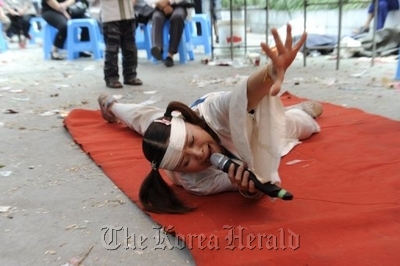CHONGQING, China (AFP) ― Hu Xinglian kneels before the corpse of Liang Zhicai and, with one hand on his metal coffin, lets out a piercing wail. But Hu is not at all grief-stricken ― she is a professional mourner.
In parts of China, where rural pre-burial rituals are still observed, mourners known as “kusangren” are hired to guarantee that a funeral is a spectacle in grief. And 53-year-old Hu is up to the task.
She comes to work with a full sound-system, multi-color spotlights and the six members of her band, “The Orchestra of the Star and River of Chongqing.”
In parts of China, where rural pre-burial rituals are still observed, mourners known as “kusangren” are hired to guarantee that a funeral is a spectacle in grief. And 53-year-old Hu is up to the task.
She comes to work with a full sound-system, multi-color spotlights and the six members of her band, “The Orchestra of the Star and River of Chongqing.”

Her job offers a study in contrasts between modern living and tradition in the southwestern province-sized municipality, home to more than 30 million people and a symbol of the rapid urbanization seen across China.
“People in the countryside still show a lot of respect for their dead ancestors,” says Hu, who gained a following in the Chongqing area under a stage name, Ding Ding Mao, which means “Dragonfly” in the local dialect.
Her performance for the funeral of Liang, who died aged 70, takes place under a canvas tent mounted on metal poles outside a forest of rundown buildings.
Liang’s coffin is placed in the centre of the makeshift altar, with incense sticks burning around it. A fruit basket has been left as an offering to the dead.
Hu quickly questions a few of the mourners, so that she has enough details about Liang’s life to give the impression that she has known him forever.
She and her band eat dinner al fresco with the family ― washed down with ample quantities of Sichuan beer. Hu then dons a full white robe ― the color of mourning in China.
Friends and neighbors of the dead man sit around the edges of the tent.
Some smoke, others chat or make telephone calls. Liang’s relatives kneel around the coffin, their eyes fixed on Hu as her wails reach a fever pitch.
“Why did you leave us so soon? The earth is covered in a black veil for you. The rivers and streams are crying to tell your story ― that of an honest man,” Hu sings.
“I shed tears for your children and grandchildren. We’re so sorry we could not keep you here,” she croons between sobs.
“This is goodbye, with no return date. The path to the great beyond is arduous, and beset by storms. Take good care of yourself.”
Hu then dances for several minutes, falling to her knees and crawling several times before shaking the hands of the visibly moved family members. And then suddenly, the evening turns festive.
Funereal chants are replaced with popular songs and comedy stories. A belly dancer performs, followed by a woman in a leopard-print bustier, black leather hot pants and fishnet stockings who writhes to a pulsating techno beat.
Lin Shiqing, Liang’s niece, explains that the spectacle should not be seen as a lack of respect for the dead.









![[K-pop’s dilemma] Time, profit pressures work against originality](http://res.heraldm.com/phpwas/restmb_idxmake.php?idx=644&simg=/content/image/2024/05/08/20240508050705_0.jpg&u=20240508171126)








![[Today’s K-pop] Stray Kids to drop new album in July: report](http://res.heraldm.com/phpwas/restmb_idxmake.php?idx=642&simg=/content/image/2024/05/09/20240509050659_0.jpg&u=)